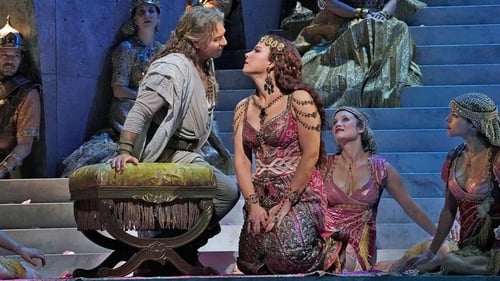
Laurent Naouri
출생 : 1964-05-23, Paris, France
약력
Initially beginning his education at the École Centrale de Lyon, Naouri decided to concentrate on opera in 1986 and continued his musical studies at the Guildhall School of Music and Drama in London.
His professional career in France began in 1992 with performances in the title role of Darius Milhaud’s Christophe Colomb (Christopher Columbus) for the opening of the Imperial Theatre in Compiègne. Progressing rapidly, his career quickly comprised a very varied repertoire ranging from Monteverdi to contemporary composers under such conductors as Maurizio Benini, William Christie, René Jacobs, Marc Minkowski, and Kent Nagano.
Naouri made his debut at the Opéra Garnier in the role of Thésée in Rameau's Hippolyte et Aricie, followed by Eugene Onegin at the Opéra de Nancy, interpreting at the Opéra Bastille the roles of the Comte Des Grieux in Massenet's Manon and Figaro in The Marriage of Figaro. A wide range of roles has followed, including many from the Baroque era including Rameau's Platée and Les Indes galantes and Handel's Alcina.
In Britain, he has appeared at the Royal Opera House in 2006 in the role of Escamillo in Carmen; in the United States at the Santa Fe Opera he appeared in the same role in the 2006 Carmen . Also at the Santa Fe Opera, he is scheduled for the role of Falstaff in Verdi's opera of the same name for June/July 2008 and as Germont in the 2009 La traviata starring his wife as Violetta.
Naouri is married to soprano Natalie Dessay, and they have two children.

In love with an unknown lady, a young soldier discovers that her grandmother holds a secret to win at cards. Although his beloved shares his feelings, happiness slips out of reach when his obsession with the powerful secret drives him to madness.

The High Priest of Dagon
가자(Gaza) 지구의 어떤 마을 광장에 히브리 사람들이 모여 여호와에게 블레셋(Philistines)의 억압에서 자유스럽게 해달라고 기도한다. 사사(재판관이자 지도자)인 삼손(Samson)이 나와 믿음이 부족하다고 사람들을 책망한다. 블레셋 장군 아비멜렉(Abimelech)이 히브리 백성들의 유일신 여호와를 부인하자 삼손이 아베멜렉을 죽이는데...

Pandolfe
마스네의 매혹적인 오페라가 베르트랑 드 비이의 지휘와 희극오페라 연출의 대가 로랑 펠리의 연출로 메트에서 초연된다. 로랑 펠리는 메트에서 이미 도니체티의 '연대의 딸'과 마스네의 '마농' 연출로 찬사를 받았다. 프랑스어 원제는 ‘샹드리용’이며 여주인공 신데렐라의 이름도 이 오페라 속에서는 ‘샹드리용’으로 불린다. 조이스 디도나토가 이 작품의 타이틀 롤을 맡아 자신의 메트 배역을 또 하나 첨가했다. 이 작품은 로열오페라하우스, 바르셀로나 리세우 대극장, 브뤼셀 왕립극장, 릴 오페라와 메트 오페라가 공동으로 제작했으며, 산타페 오페라에서 첫 공연이 이루어졌다.

Vautrin / Trompe-la-mort / Jacques Collin
An impressive masked figure, Trompe‑la‑mort reveals his true character through his impalpable latent energy and a plot abounding in tragic twists of fate. An ambivalent character, both regal in bearing and warmly protective, cruel and yet loving, rapacious and indomitable even in the face of madness, this ’Machiavelli among miscreants’ destined to become chief of police, uses his conquests to advance relentlessly in the pursuit of his aims whilst keeping his hand closely hidden. Guy Cassiers, working for the first time with the Paris Opera, portrays a three-tiered society where some rise and others fall.

Golaud

Fieramosca
With his affinity for the 16th-century sculptor Benvenuto Cellini's advocacy of artistic and personal freedom, Hector Berlioz went straight for the grand gesture with his first completed opera. Returning to it years after initial production debacles, Berlioz stated that he would 'never again find such verve and Cellinian impetuosity, nor such a variety of ideas.' The plot revolves around Cellini's wooing of Teresa, a match frustrated at every opportunity by his rival, the cowardly Fieramosca. Benvenuto Cellini is a pithy work combining romance, excitement, violence, comedy and spectacle; the perfect stage for Terry Gilliam's stylishly colorful and larger than life directing.

Escamillo
Written by Georges Bizet, on a libretto by Henri Meilhac and Ludovic Halévy, Carmen premiered at Opera Comique in Paris, France on March 3, 1875. The opera spurred mixed emotions amongst critics and casual operagoers. As a result, numerous planned performances were canceled. Bizet died on June 3, 1875 firmly believing that Carmen was a failure. Since the early 1880s, however, Carmen has been one of the most frequently performed operas in venues around the world. [BluRay.com]

Le Baron de Gondremark
Live performance from Opéra National de Lyon.

Fieramosca
Live performance from Salzburg Festival Opera, August 2007.
The story tells of Cellini's love for Teresa, daughter of the Papal Treasurer Balducci. His rival, the Papal Sculptor Fieramosca, overhears Cellini plotting to run away with Teresa during the carnival.

Belcore
Live Paris 2006

Le Chambellan
Getting into his grandfather's pottery workship at night, a little boy finds an unusually large vase. Fascinated, the child feels the still-warm material, which - whether by a miracle ot the hand of a magician, who knows? - at once changes into a magnificent piece of Chinese porcelain. Presently, from behind the great blue-enamelled trees, there appears a fisherman in his sampan... That's how the story of "The Nightingale", told all in music, begins, as the waking dream of a child in the land of Chinese art - and of mobile phones and webcams.

Himself
Featurette from the Opus Arte DVD of Les Paladins by Jean-Philippe Rameau staged at the Théâtre du Chatelet in Paris, 2004.

Orcan
"Inspired by a fable by La Fontaine, [composer Jean-Philippe] Rameau produced perhaps his most brilliant music for his penultimate great work, blending reality and the surreal on several levels." — from the DVD back cover

Narbal
This epic opera follows Virgil, beginning as the Greeks appear to have ceded the field after ten years of the Trojan War. Cassandra tries to warn of the terrible fate to come, but fate is set and Troy falls. The first two acts cover this tragic end, then the flight of survivors to Carthage and events at Carthage continue in acts 3 - 5, culminating in the further voyage for Italy and Rome. This is Virgil's classic epic, in operatic form, in about a three and a half hour performance from French Opera.

Borée
Director Robert Carsen and his creative team flood the stage with summer blossoms, drifts of autumn leaves, winter snows and thunderous spring storms. The cast of 140 are attired in elegant costumes inspired by late 1940s Dior. This mythical tale of a young queen, Alphise, determined to abdicate rather than contemplate an enforced marriage to a descendant of Boreas, is nothing less than highly-charged.

Escamillo
David McVicar's exhilarating new production, with Anne Sofie von Otter in the title role, restores the Opera Comique to Bizet's masterpiece. Philippe Jordan, in his Glyndebourne debut, conducts the London Philharmonic Orchestra, the Glyndebourne Chorus, and a cast which includes Marcus Haddock, Laurent Naouri, and Lisa Milne.

Cithéron, a Satyr
The prologue sets the stage for the action: Thespis, Momus and Thalie announce the subject of the play. It is a comedy mocking the folly of man...and the story of a trap set by Jupiter to cure Juno of her jealousy. The trap? It consists in convincing the water nymph Platée that Jupiter is in love with her. Mercury officially declares Jupiter’s love to Platée. When the god appears before her – first as a donkey, then an owl - the nymph calls on the birds of the marshes, but they scare Jupiter away. Luckily he quickly returns and declares his love for Platée. He even wants to marry her. La Folie comes to sing for the fiancée during an absolutely chaotic scene. However, as the couple prepares for the wedding, Juno arrives. Furious, she puts an end to the farce and ascends to the heavens with Jupiter. Humiliated, Platée understands she has been duped. She swims off into the marshes, as the chorus sings an ironic song in her honour.

Agamemnon, roi d'Argos
This is a joy from beginning to end. Although there are many tricks and ideas from Laurent Pelly, as always he seems to still retain the Offenbach magic. La Lott and Monsieur Beuron are a joy, but so is everyone else. The Patriotic Trio by the sea is both a hoot and wonderfully sung, the score seems truly complete yet never flags and the finale sequences for especially acts 1 & 2 are a joy of movement and sound fused as one glorious Offenbachian moment.








